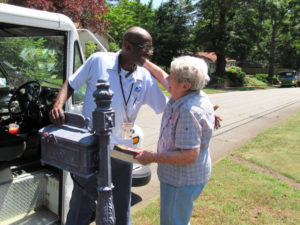Sharing Thankfulness
 There are many surprising stories in the Bible. It is a book filled with people who make choices and react to situations in ways we might not expect. Every time I read this story of Jesus healing ten lepers, I am surprised and disappointed by the reaction (or lack of reaction) from nine out of the ten people who were healed.
There are many surprising stories in the Bible. It is a book filled with people who make choices and react to situations in ways we might not expect. Every time I read this story of Jesus healing ten lepers, I am surprised and disappointed by the reaction (or lack of reaction) from nine out of the ten people who were healed.Luke 17:11-19 (ESV) 11 On the way to Jerusalem he was passing along between Samaria and Galilee. 12 And as he entered a village, he was met by ten lepers, who stood at a distance 13 and lifted up their voices, saying, “Jesus, Master, have mercy on us.” 14 When he saw them he said to them, “Go and show yourselves to the priests.” And as they went they were cleansed. 15 Then one of them, when he saw that he was healed, turned back, praising God with a loud voice; 16 and he fell on his face at Jesus’ feet, giving him thanks. Now he was a Samaritan. 17 Then Jesus answered, “Were not ten cleansed? Where are the nine? 18 Was no one found to return and give praise to God except this foreigner?” 19 And he said to him, “Rise and go your way; your faith has made you well.”
Nine out of ten did not come back to give thanks. Ninety percent. Their lives were changed forever in an instant. They went from unclean to clean. They went from ostracized to acceptable. They were untouchable and could now return to the community. It is difficult to full describe the complete change in their existence that happened that day. Only one came back to say thank you to Jesus.
Here is the problem. I do not believe for a moment that the other nine were not thankful. They knew what a life-changing event it was. They would likely tell the story to others for the rest of their lives. They would always remember that day. But they did not express their thankfulness to the One who did it.
I believe we are thankful as well. Most of us will never experience a day with a physical change like that, but we are blessed in so many ways. We need to take the time to share that thankfulness with people who are a blessing to us. An even greater gift has been given to us as we are baptized into Christ. We have experienced a change that is eternal. We are cleansed. We are accepted by God. We are in community with Him. Do we express our thanks to Him for that amazing gift? Don’t be part of the 90 percent. Give him your thanks every day. And if you have not received that gift. Take hold of it today.
Brian
Veterans Day
 During our recent trip to Washington D.C., some of the most impactful moments were our visits to war memorials . I have spent time at the memorials before, but there is still something special about seeing those statues, the names etched in granite, the thousands of perfectly aligned headstones and the Tomb of the Unknown Soldier. I expected all of that. What caught me by surprise was the large group of veterans who were visiting the Korean and Vietnam War Memorials while we were there. It was amazing to walk through these memorials near veterans who had experienced the events themselves. Putting others above ourselves is something we are called to do as Christians, and it is something those veterans had to do daily at a level that is difficult for others to comprehend. Their service guarantees so many of the freedoms we enjoy. For those in our church family who are veterans, know that we are thankful for you and your service.
During our recent trip to Washington D.C., some of the most impactful moments were our visits to war memorials . I have spent time at the memorials before, but there is still something special about seeing those statues, the names etched in granite, the thousands of perfectly aligned headstones and the Tomb of the Unknown Soldier. I expected all of that. What caught me by surprise was the large group of veterans who were visiting the Korean and Vietnam War Memorials while we were there. It was amazing to walk through these memorials near veterans who had experienced the events themselves. Putting others above ourselves is something we are called to do as Christians, and it is something those veterans had to do daily at a level that is difficult for others to comprehend. Their service guarantees so many of the freedoms we enjoy. For those in our church family who are veterans, know that we are thankful for you and your service.There are several people currently serving in the military who have a connection to our Southwest family. This week is a good time to think of them and to renew our commitment to praying for them.
Brian
“This is my commandment, that you love one another as I have loved you. Greater love has no one than this, that someone lay down his life for his friends.” John 15:12-13
How to Get Along
 Last Sunday night we looked at 1 Corinthians 8 and the trouble that the church in Corinth had coming to an agreement on an issue where there were differing opinions: whether or not it was alright to eat meat that had been offered to idols. People on both sides of the argument were confident that they were right, and those with a differing view were wrong.
Last Sunday night we looked at 1 Corinthians 8 and the trouble that the church in Corinth had coming to an agreement on an issue where there were differing opinions: whether or not it was alright to eat meat that had been offered to idols. People on both sides of the argument were confident that they were right, and those with a differing view were wrong.The core issue is the need for Christians coming from different backgrounds to get along. Although our issues are different, our struggle can be the same. We want people to see things the way we see them. We have a hard time listening because we are too busy trying to convince. Romans 14 addresses the same kind of conflicts and offers the key to the solution in verse 19: “Let us therefore make every effort to do what leads to peace and to mutual edification.” Make every effort. We are not to make a half-hearted effort. We are not to make every effort to destroy the brother or sister we disagree with. We are to make every effort to make peace, to improve and to seek unity in agreement with God.
In his book, How to Be a Christian Without Being Religious, Fritz Ridenour describes three ways to put this into action.
Be genuine. In other words, be honest and open with other people. Appropriateness and sensitivity are vital.
Be acceptant. Respect and like people for who they are rather than trying to make them over to suit your values.
Be understanding. Have empathy by putting yourself in someone else’s shoes. Doing these things can lead us to the kind of mutual respect that a good family needs.
I would add a fourth action that can help. Be forgiving. Anytime there is strong disagreement, there is the potential for broken relationships and grudges. As followers of Jesus, we cannot be content with that. Tonight we will talk more about the importance of forgiveness and its role in helping us get along.
Brian
Shepherds
 This Sunday is an important day for our church family. We will be installing four new elders this morning. There are several terms that have been used in scripture and through church history to describe this role: elder, overseer, pastor, bishop. Over the years I have come to appreciate one term over the others: shepherd. Sheep are mentioned more than 500 times in the Bible. A consistent theme is their need for shepherds. The church has that same need.
This Sunday is an important day for our church family. We will be installing four new elders this morning. There are several terms that have been used in scripture and through church history to describe this role: elder, overseer, pastor, bishop. Over the years I have come to appreciate one term over the others: shepherd. Sheep are mentioned more than 500 times in the Bible. A consistent theme is their need for shepherds. The church has that same need.Usually when the time comes to select new shepherds for a congregation, the two main questions asked are how and who? I would like you to think about a third question: why? There’s the obvious answer of God’s design and the example of scripture, but can we know the practical reasons why He wants the church to have shepherds? Tommy South, minister of the Glen Allen Church of Christ in Virginia, answers the why question in this way.
- We need shepherds because congregations need leadership. (1 Timothy 3, Titus 1)
- We need shepherds because congregations need stability, especially in face of opposition. (Acts 14)
- We need shepherds because congregations need instruction. (1 Timothy 3:2, Titus 1:9)
- We need shepherds because congregations need models of the Christian life. (1 Timothy 3:2, Titus 1:7)
- We need shepherds because congregations need protection. (Acts 20:28-31)
I believe that with Greg, David, Brent and Butch we will be adding shepherds who exemplify these answers. They will be a blessing to this church as a whole and to Jeff, Scott, Jack, Richard and Ken who are currently shepherding our flock. Please join me in being encouraging, supportive and patient with these men and their families. Pray for them regularly and for the church that God will continue to bless the work here for His kingdom. And pray that we will all follow the example of the Good Shepherd.
Brian
“I am the good shepherd. I know my own and my own know me, 15 just as the Father knows me and I know the Father; and I lay down my life for the sheep.” John 10:14
Million Dollar Sunday
The Bible. We Want Everyone To Get It.
 Since 1961, Eastern European Mission (EEM) has been providing God’s Word to the people of Eastern Europe and beyond in their own languages. Now, EEM provides Bibles and an array of Bible-based materials in more than 20 languages in over 30 nations–to individuals, churches, public schools, universities, orphanages, hospitals, prisons, and anywhere else Bibles are needed – free to all.
Since 1961, Eastern European Mission (EEM) has been providing God’s Word to the people of Eastern Europe and beyond in their own languages. Now, EEM provides Bibles and an array of Bible-based materials in more than 20 languages in over 30 nations–to individuals, churches, public schools, universities, orphanages, hospitals, prisons, and anywhere else Bibles are needed – free to all.EEM is working with national leaders in countries like Ukraine, Croatia, and Greece to distribute thousands of Bibles and Bible-based materials. EEM is also currently fulfilling requests for Bibles in four entire regions in Ukraine, and 155,000 books in Kazakhstan, Belarus and Russia.
Join us during the Million Dollar Sunday campaign to fulfill these requests for God’s Word in 2019.
To learn more, visit milliondollarsunday.org. Find EEM on Facebook and Instagram @EasternEuropeanMission
Example
 Let no one despise you for your youth, but set the believers an example in speech, in conduct, in love, in faith, in purity. – 1 Timothy 4:12
Let no one despise you for your youth, but set the believers an example in speech, in conduct, in love, in faith, in purity. – 1 Timothy 4:12For ten years as a youth minister, I would plan the Sunday evening each May when we would honor our graduating seniors. More times than not, 1 Timothy 4:12 would be read during the evening either in my comments or as a favorite verse of one of the graduates. Because of the theme of those services, we usually emphasized the word “youth.” That is an important part of what the Spirit says through Paul, but I would like you to consider the word “example” and the ways he explains to be one.
When I was a child, I was not always good at following written instructions. There was one big exception to that pattern: Legos. There was something about the clarity of the Lego instructions that made them easy to follow every time. It was the pictures. I could see from the pictures in each step to understand how it worked. In adult life, YouTube videos have replaced Lego instructions for me. After watching people fix things on YouTube, I have been able to repair everything from the ice maker to my lawnmower to my car. I don’t have any real training in any of those areas. Seeing an example allows me to do things I did not think I could do otherwise. We can experience the same thing in our walk with God.
Think for a moment about the areas where Paul instructs Timothy to set an example:
- Speech
- Conduct
- Love
- Faith
- Purity
When you think of each of those words, is there a person in your life who comes to mind that is a great example of those words in action? There are for me. Most of us have people like that. We know we should be people like that, but we often do not live up to it. Where do we learn how to do those things better? We learn from their examples. How can those who do not feel equipped to teach or have the opportunity to teach help others grow in those areas? We can be examples. Even those who do teach can teach better by being examples.
Look for the good examples. Be an example this week.
Brian
“If I then, your Lord and Teacher, have washed your feet, you also ought to wash one another’s feet. For I have given you an example, that you also should do just as I have done to you. Truly, truly, I say to you, a servant is not greater than his master, nor is a messenger greater than the one who sent him. – John 13:14-16
Encouragement
 As we remembered September 11 last week, you may not be aware that September 12 is also a significant day: the National Day of Encouragement. We often underestimated the impact that we can have by being encouragers. This article from Scott Franks, Preaching Minister at the Burnt Hickory Church of Christ is an excellent example of what encouragement can do. – Brian
As we remembered September 11 last week, you may not be aware that September 12 is also a significant day: the National Day of Encouragement. We often underestimated the impact that we can have by being encouragers. This article from Scott Franks, Preaching Minister at the Burnt Hickory Church of Christ is an excellent example of what encouragement can do. – BrianFor 35 years, Floyd Martin was the mailman for the same neighborhoods in Marietta, Georgia. Over that time, he became a daily fixture in the lives of hundreds of people. He always made time to talk and check on elderly customers on his route. He carried along milk bones to give the dogs and lollipops for the children. He’d put $20 in the mailbox for kids who were graduating from high school. Little Mae Bullington loved her mailman so much, she dressed up like for career day at school. (Click here to continue reading at 728b on Facebook.)
A Model of Good Works
 A few weeks ago, I shared part of an article from Wes McAdams, Preaching Minister at the church of Christ on McDermott Road in Plano, Texas. Wes has written a series of articles about what he learned by reading the Bible one book at a time. In the first part of his article about the Pastoral Epistles (1 Timothy, 2 Timothy and Titus), he emphasized ideas for leaders. In the second part of his article, we find something that should be part of the daily walk of all Christians: doing good works.
A few weeks ago, I shared part of an article from Wes McAdams, Preaching Minister at the church of Christ on McDermott Road in Plano, Texas. Wes has written a series of articles about what he learned by reading the Bible one book at a time. In the first part of his article about the Pastoral Epistles (1 Timothy, 2 Timothy and Titus), he emphasized ideas for leaders. In the second part of his article, we find something that should be part of the daily walk of all Christians: doing good works.One of the most important parts of both Timothy and Titus’ roles was modeling good works. If Timothy and Titus taught the truth about Jesus, but their life did not reflect the Spirit’s sanctifying work, then their teaching would be in vain. This, of course, does not mean Timothy and Titus had to be perfect, but it does mean teaching and preaching always brings a level of scrutiny for which these men needed to be prepared.These are the sort of instructions Paul gave to them.
- Pursue righteousness.
- Pursue faith.
- Pursue love.
- Pursue peace.
- Avoid controversies and quarreling.
- Be kind to everyone.
- Patiently endure evil.
- Correct opponents with gentleness.
I love what Paul wrote to Timothy, “The aim of our charge is love that issues from a pure heart and a good conscience and a sincere faith.” The goal of everything Paul was doing was love. Love that issues from a pure heart. Paul knew that in order for his own ministry to be successful and for the ministries of his protégé to be successful, they had to all model love and work to bring about love in their life of the church.
When love is our goal and good works are our actions, God is glorified. Let’s do the good works God has planned for us to do this week.
Brian
In the same way, let your light shine before others, so that they may see your good works and give glory to your Father who is in heaven. – Matthew 5:16
Letters For the Church
 Last week we began a new series about the Pastoral Epistles on Sunday mornings. 1 Timothy, 2 Timothy and Titus are referred to this way, because they are written by Paul to ministers in the church. Most of us are not full time ministers, but there is still a great deal to learn from these letters. For that reason, I like to think of them as letters for the church. I would encourage you in the coming weeks to read each of these letters. They are short enough that it can easily be done in one sitting. When reading the letters this way we can often see things we haven’t noticed, and we are much more aware of context.
Last week we began a new series about the Pastoral Epistles on Sunday mornings. 1 Timothy, 2 Timothy and Titus are referred to this way, because they are written by Paul to ministers in the church. Most of us are not full time ministers, but there is still a great deal to learn from these letters. For that reason, I like to think of them as letters for the church. I would encourage you in the coming weeks to read each of these letters. They are short enough that it can easily be done in one sitting. When reading the letters this way we can often see things we haven’t noticed, and we are much more aware of context.Wes McAdams, Preaching Minister at the church of Christ on McDermott Road in Plano, has written a series of articles about what he learned by reading the Bible one book at a time. His thoughts about these letters for the church give insight to our study.
Paul’s three short letters to his sons in the faith, Timothy and Titus, might be compared to locker room speeches or a commanding officer trying to inspire his troops. In these three letters, Paul describes the type of work these young ministers ought to be doing. I noticed that there are at least three areas Paul focused on when he described the duty of these ministers.The Minister’s “Charge”One of the recurring words, especially in Paul’s letters to Timothy, is the word “charge.” Paul had “charged” both of these young ministers to do a job. He had entrusted them with great responsibility. Timothy had been sent to work with the Ephesus church and Titus with various churches on the island of Crete. Like soldiers sent on a mission, these were their marching orders.Be A TeacherThe primary area of responsibility on which Paul told Timothy and Titus to focus was teaching. Both communities with which these men were working were plagued with false teachers. So the church in both communities needed men who would devote themselves “to the public reading of Scripture, to exhortation, to teaching.”Be A LeaderI find it undeniably true that Timothy and Titus were entrusted with positions of leadership. Like a chain of command, Paul gave marching orders to these two men and they were expected to turn around and command, charge, and entrust various responsibilities to other Christians in their local communities.
It would be easy for people to dismiss these things as instructions for leaders, rather than a charge to all Christians. However as we study through these books, we will learn that there is instruction for all of us to be the church that God designed.
Brian
You can read Wes’ full post at Radically Christian.
School Days
 The week has finally arrived. Some dread it. Some are excited about it. It’s time for our students, teachers, staff and administrators to head back to school. Because school starts at different times in different places, I have already seen people sharing their first day of school pictures for the last week and a half. In our church family some of us will be taking the first day of school picture for the first time as a child heads off to preschool or kindergarten. Some families like ours will be taking the last first day of school picture for a child starting his senior year. For many of our families, those pictures are just wonderful memories. Like the song says, “Time is filled with swift transition.”
The week has finally arrived. Some dread it. Some are excited about it. It’s time for our students, teachers, staff and administrators to head back to school. Because school starts at different times in different places, I have already seen people sharing their first day of school pictures for the last week and a half. In our church family some of us will be taking the first day of school picture for the first time as a child heads off to preschool or kindergarten. Some families like ours will be taking the last first day of school picture for a child starting his senior year. For many of our families, those pictures are just wonderful memories. Like the song says, “Time is filled with swift transition.”There are lots of reasons to get excited about the first day of school. We get to see friends after the summer break. The rhythm of having a schedule returns. There are more things to learn, sports to play, instruments to master and projects to be done. And wouldn’t many of us who have finished school welcome recess or naptime back into our daily schedules?
One of the best things about the return to school is the opportunity for a fresh start. If the last school year did not end the way we hoped, we can change that beginning this week. We can get up earlier, study harder, be more organized, listen better and make new friends. One of the amazing things God created us with is the ability to change and better ourselves. Who we surround ourselves with has an impact on how this year will go. What can we do to make this school year better than the last one?
Dan Williams, Vice President for Church Relations at Harding University, believes the answer to that question is found in four principles about how we choose friends in Proverbs 1:10-19.
- ASSOCIATION (Proverbs 1:10): “My son, if sinners entice you, do not consent.” Sometimes when we are not even doing things wrong, we find ourselves in the midst of people who are. As a result people get the wrong impression about us. Choose friends wisely.
- CONTAGION (Proverbs 1:11-14): “Throw in your lot among us.” As Christians we want to have an influence on those around us. If we are not careful, we may be influenced negatively instead.
- SEPARATION (Proverbs 1:15-16): “My son, do not walk in the way with them; hold back your foot from their paths.” Sometimes we have to separate ourselves from people or situations to be the people God wants us to be.
- DESTINATION (Proverbs 1:17-19): Such are the ways of everyone who is greedy for unjust gain; it takes away the life of its possessors.” We go into this school year and our lives with a destination in mind. Are we surrounding ourselves with others who are heading in the same direction?
Brian

